“There are very few Doctors from the state of Odisha in the United States,” says Dr. Amit Chakrabarty, Secretary of American Association of Physicians of Indian Origin (AAPI), the largest ethnic medical association in the US. “I am one of the very few physicians from my home state, who are active and members of Odisha Doctors International Association (ODIA) and working towards expanding ODIA with members from across the globe. As the Treasurer of Odisha Society of Americas Health and Wellness Group, I am honored to work collaboratively with other members for the cohesive work the organization has been doing during the pandemic, while representing the great and historical state of Odisha at the national AAPI leadership”
Among the several initiatives, Dr. Chakrabarty and his colleagues in the US from the state of Odisha have initiated and established a new organization, Doctors of ODIA collaborating with local organizations and to provide healthcare to Odisha people, as pandemic impacts their livelihood.
Dr. Chakrabarty, the multi-talented, generous and hardworking leader of AAPI says, “With a deep sense of commitment to serve the people of Odisha, we have, under the leadership of Dr. Debashis Ray of Georgia, now expanded our organization to international standards with participation of 37 countries.”
Lamenting that Odisha has always been “under-represented and underserved and relatively a poor state in India with regards to medical collaborations in this country,” Dr. Chakrabarty says, “We are a small group of dedicated people who want to make a difference for our home state. For this reason I have put my heart and soul to make our state Medical Organization a great Resource to help our home state.”
The group of Doctors at Odisha Doctors International Association recently organized an international webinar on February 6th for the general public benefitting the local population in the state of Odisha to educate and answer the questions on Covid and vaccines. “I believe, we can make a huge difference by providing the people of Odisha necessary services and supplies hat will go a long way in the upliftment of the health status of the people of the state of Odisha.”
“The launch of the Covid 19 vaccine amidst the crisis and havoc created by the pandemic gives us all HOPE,” says Dr. Chakrabarty. “Team ODIA geared up to present in extensive details about the Coronavirus, the new mutant viruses and the different types of COVID-19 vaccines and global experience with the vaccine so far, answering the questions and concerns surrounding the Covid 19 vaccine.”
The global seminar lasting over three hours was inaugurated by Mr. Dhamendra Pradhan, Union Minister for Petroleum and Natural Gas and was attended across zoom Facebook and YouTube in large numbers Odisha actor and humanitarian and ODIA brand ambassador Mr. Sabyasachi Mishra graced the seminar by his presence.
Physician teams of ODIA from 11 countries and presenters included from state of Odisha. Dr. Niranjan Mishra, Department of Public Health, who showed the audience on the efficient ways Odisha has been planning the vaccine rollout. Other participants were from UK Australia, New Zealand, Malaysia, Singapore, India, Ireland, UAE, Oman, Maldives, in addition to USA.
In October of 2020 the Health and Wellness group of The Odisha Society of America’s donated a mobile Covid screening unit to the Health and Family Welfare department of the Government of Odisha. “The purpose of this unit is to provide screening at multiple places during the Covid pandemic and be available for use by the government in remote and rural areas of the state. The organization’s brand ambassador actor has represented us at all of our projects in Odisha and helped carry forward our Mission during the pandemic with sheer care and diligence,” says Dr. Chkarabarty. “Our second mobile Covid screening donated by one of our senior founder member of Health and Wellness group is also complete and has been in use by the Government of Odisha since the end of December 2020.”
In December 2020 the Health and Wellness group supported the Government of Odisha with 500 Dr. Diaz adult fingertip Pulse oximeters, to be used by healthcare workers in Odisha in remote areas lacking adequate triaging facilities, helping those severely compromised by Covid. “Our mission and vision is to continue to provide medical necessities and healthcare related support to the people of Odisha in future,” adds Dr. Chakrabarty.
“As an active member of ODIA, I am happy and immensely satisfied that I could be part of this noble organization that is committed to serve the poorest of the poor in India,” says, Dr. Chakrabarty, whose leadership qualities have come to be recognized by the larger AAPI general body, who have elected him to be the national AAPI Secretary in 2020, and he is looking forward to serve the largest ethnic medical organization as the Vice President and beyond, with his vision to take AAPI to newer heights.
“It is amazing how quickly these two years have passed by. With the help of Dr. Annu Terkonda, I helped revive the Indian Medical Council of St Louis (IMCStL), that had been dormant for more than 8 years to become one of the most vibrant chapters of the American Association of Physician of Indian Origin (AAPI), culminating in hosting the National AAPI governing body meeting during our upcoming Diwali Gala,” said Dr. Amit Chakrabarty, President of IMCStL 2018 and 2019, and currently the National AAPI Secretary said, after receiving an Award recognizing his contributions to the growth of AAPI and the revival of Indian Medical Council of St Louis. Dr. Suresh Reddy, Immediate Past President of AAPI honored Dr. Amit Chakrabarty during the Mini Convention held in Chicago on Saturday, September 26th, 2020.
Dr. Amit Chakrabarty, who was honored with the National AAPI Distinguished Service Award 2018 and the President’s Award for Services in 2019 by the Indian American Urological Society, says, “I consider myself to be a leader and shine in the fact that I can get people motivated. I lead by example that motivates people. I am fun loving and have always striven to brush off any obstacles that come in the way.”
Dr. Chakrabarty has been the President of two AAPI subchapters, namely Alabama Association of Physicians of Indian Origin 2012-2014 and Indian Medical Council of St Louis 2018-2020 reviving them from obscurity and inactivity to make them one the most vibrant chapters of AAPI. Under his leadership, Alabama AAPI produced 13 out of the last 15 Regional directors and the St Louis Chapter hosted the most productive and successful AAPI governing body within 3 years of its revival from 10 years of inactivity. He also serves as the Chairman, Board of Trustees, Huntsville India Association and was the President, Indian Cultural Association of Birmingham, and led an Indian Delegation to Japan at the International Youth Year in 1985.
It’s been a long journey with American Association of Physicians of Indian Origin (AAPI) for Dr. Amit Chakrabarty, from being an ordinary member of the largest ethnic medical society in the United States to a Regional Leader, currently serving as the Vice Chair of the Board of Trustees (BOT) of national AAPI, and now looking forward to lead the organization that he calls as his second family and has come to adore. “Since my membership to AAPI In 1997, for more than two decades I have been a dedicated foot soldier for the American Association of Physicians of Indian Origin,” Dr. Amit Chakrabarty a Consultant Urologist, Poplar Bluff Urology, Past Chairman of Urologic Clinics of North Alabama P.C., and the Director of Center for Continence and Female Pelvic Health.
In his endeavor to play a more active role and commit his services for the growth and expansion of AAPI that represents the interests of over 100,000 Indian American physicians, Dr. Amit Chakrabarty, the Alabama-based Indian American Physician wants this noble organization to be “more vibrant, united, transparent, politically engaged, ensuring active participation of young physicians, increasing membership, and enabling that AAPI’s voice is heard in the corridors of power.”
A Patron Member of AAPI for 25 years, Dr. Chakrabarty has been an active AAPI Governing Body Member for over a decade. He has served AAPI in several capacities. He has served with distinction as an AAPI Regional Director from 2004 to 2006. There is hardly any Committee of AAPI that he was not part of in the past two decades. He was the Chair of AAPI Ethics and Grievances Committee in 2011-2012, and had served as the Chair of AAPI Journal Resource Committee in 2012-2013. He has served as a Member of AAPI IT committee, Journal Committee, Website Committee, Bylaws Committee, Alumni Committee, Ethics and Grievances Committee, and AAPI Charitable Foundation. “I have attended more than 100 AAPI events including Annual conventions, Governing Body meetings, Global Summits and Pravasi Bharatiya Divas in the past 20 years,” he recalls.
A multi-talented physician, Dr. Chakrabarty has not only showcased his musical talents at almost every major AAPI event, he was the Founder and Creator of AAPI’s Got Talent, at AAPI Annual Convention 2010 in Washington DC. He was the Founder and Conductor of “Mehfil” @ AAPI Annual Convention in Atlanta 2008, and has been conducting the ever popular AAPI’s Got Talent and Mehfil every year at Annual Conventions. “I love people and having good times,” he describes self. “I rarely get depressed or feel down with any failures and bounce right back. I believe in seeing the silver lining in each cloud. If life gives me lemons, I make lemonade!”
Dr. Chakrabarty has been a dreamer and devoted his talents for charity and noble deeds from childhood onwards. “Since my childhood I have been motivated for philanthropic activities that includes several school fund raising activities, organizing inter college meets in college forming a musical group in India and here primarily for fund raising.” And, as an ardent and active member of AAPI, Dr. Chakrabarty has continued these noble deeds as an adult.
One of the major goals for AAPI in recent years has been the financial stability of AAPI. Describing fund raising as his strength, he points out to his special talents and skills in raising money for AAPI in the past two decades. He says with pride that “I have been a leader in Fund Raising for AAPI and the several causes we have committed to support.”
He organized and raised funds during AAPI-Mahadevan show in Atlanta, raising almost $300,000 for AAPI in 2013. Other concerts/events he has helped organize and raise funds include: The 10 city Sukhwinder Singh Tour, 9 City Talat Aziz Fund, Pankaj Udhas Show, Hema Malini Concert, , as well as towards AAPI Hurricane Harvey Fund by conceiving and organizing “musical performance by my group Geetanjali Music.”
In addition, “I had spearheaded a fund rising in 2013 at Huntsville, Alabama collecting almost $80,000 for AAPI scholarship fund and National AAPI childhood obesity awareness program. Many of these events/concerts I had organized myself, spending my own money for travel and logistics.” Contributing his personal money as seed money for AAPI, he had single-handedly spearheaded planning a fund-raising tour called “DADA vs DADA” for AAPI Charitable Foundation in 2005. The show did not take place due to Hurricane Katrina devastating the region.
Recognizing the role of Young Physicians in AAPI, Dr. Chakrabarty wants to invest heavily in Medical Student/Residents and Young Physician (MSR/YPS) section of AAPI and in giving them leadership roles in mainstream AAPI, which will create more enthusiasm in our young members towards their parent organization. Without them there will be no AAPI in 20 years. “Give some prime time slots in the main convention to AAPI YPS, at least one night main stage should be devoted to and managed by them,” he suggests.
Realizing how hard it is for the physicians in India to come to the US for training, Dr. Chakrabarty “raised almost $100,000 for the Society of Indian American Clinical Urology for a scholarship fund for Clinical Indian Urologists to come for a month training in US.” He participated in two back to back fund raising shows 2015 and 2016 for the Hindu Temple of St. Louis raising more than $ 300,000 each year, featuring
Geetanjali musical group’s performance.
A physician with compassion, brilliance, and dedication, Dr. Chakrabarty has excelled in every role he has undertaken. As an educator at AAPI’s CMEs and Workshops, he has authored several articles/publications in Medical Journals, Chair of Entertainment Committee, and as a Founder member of Geetanjali Music Group (www.geetanjalimusic.com) that performs fund raising shows in several AAPI governing body and state chapter meetings, this AAPI leader has given his best for AAPI.
Another goal he wants to pursue for AAPI is to “Continue partnership in health care education and provide economic and material aid across the globe, working towards making AAPI, along with Indian physicians in other countries, a global health leader. I want AAPI to be a part of the decision-making process of World Health Organization and United Nations health policies especially those affecting south Asians.”
Dr. Chakrabarty says, he wants to have AAPI Charitable Foundation to be the main frame of AAPI make it more accountable. Making our noble efforts known to the society is important, he says, “We need to make their services more prominently advertised. Anytime we do press conference we use primarily them as example of what we are doing but we do not give them the support that they need.”
As a leader of AAPI, Dr. Chakrabarty wants to “form a separate political action committee (PAC) and make it financially sound so that AAPI can hire lobbyists on Capitol Hill who will help to move forward policies that are important to AAPI. VISA issues for our colleagues should top the list.”
A Gandhian at heart, Dr. Chkarabarty says, “I have always believed in Gandhiji’s principles “Satyameva Jayate” (Truth always wins). I am a Bengali from Odisha and have lived in small AAPI subchapters like Alabama and Missouri, I have no special state or chapter affiliation, I take pride in reaching across the aisle and have friends from all states and backgrounds not only in AAPI but also in my personal life participating in all ethnic festivities as my friends from Huntsville can testify.”
“I have the diverse experience to achieve each of these goals,” Dr. Chakrabarty says with confidence. “Having been a member and leader of AAPI for over two decades, I have perfected the skills necessary to move AAPI forward through the office of AAPI’s national Secretary. My mission/goal in life is to leave back a legacy of work that people will remember me fondly and proudly after I am gone.”

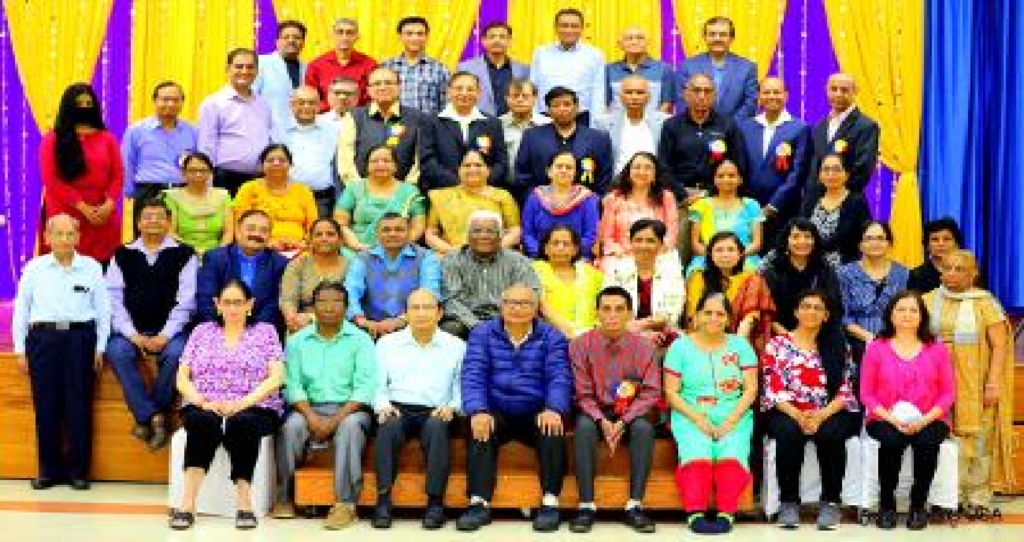 The Appreciation letter from the Governor concluded: “On behalf of the people of the State of Illinois, it is my pleasure to thank you for your ongoing work of Vaccination. Your dedication and leadership have created a lasting impact in your community and you have been an asset to all of Illinois in our collaboration to overcome the Pandemic. “J.B. Pritzker, Hon. Governor of Illinois.
The Appreciation letter from the Governor concluded: “On behalf of the people of the State of Illinois, it is my pleasure to thank you for your ongoing work of Vaccination. Your dedication and leadership have created a lasting impact in your community and you have been an asset to all of Illinois in our collaboration to overcome the Pandemic. “J.B. Pritzker, Hon. Governor of Illinois.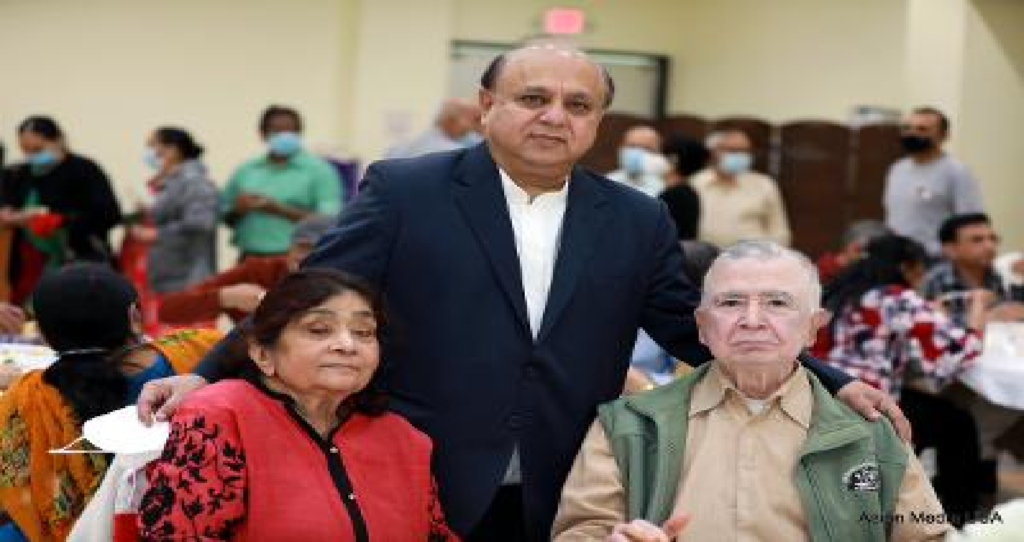 Dr Kapadia and his wife Seema Kapadia thanked each member of the team including Gujarati Seniors of Chicago team who made the vaccination camp a huge success. Dr Kapadia mentioned how his wife Seema Kapadia and his sons have been a driving force behind all these campaigns to ensure smooth execution. He added that Ms. Seema Kapadia has been present at many vaccination camps from the beginning till the end to ensure a safe, timely and equitable administration of the vaccine.
Dr Kapadia and his wife Seema Kapadia thanked each member of the team including Gujarati Seniors of Chicago team who made the vaccination camp a huge success. Dr Kapadia mentioned how his wife Seema Kapadia and his sons have been a driving force behind all these campaigns to ensure smooth execution. He added that Ms. Seema Kapadia has been present at many vaccination camps from the beginning till the end to ensure a safe, timely and equitable administration of the vaccine.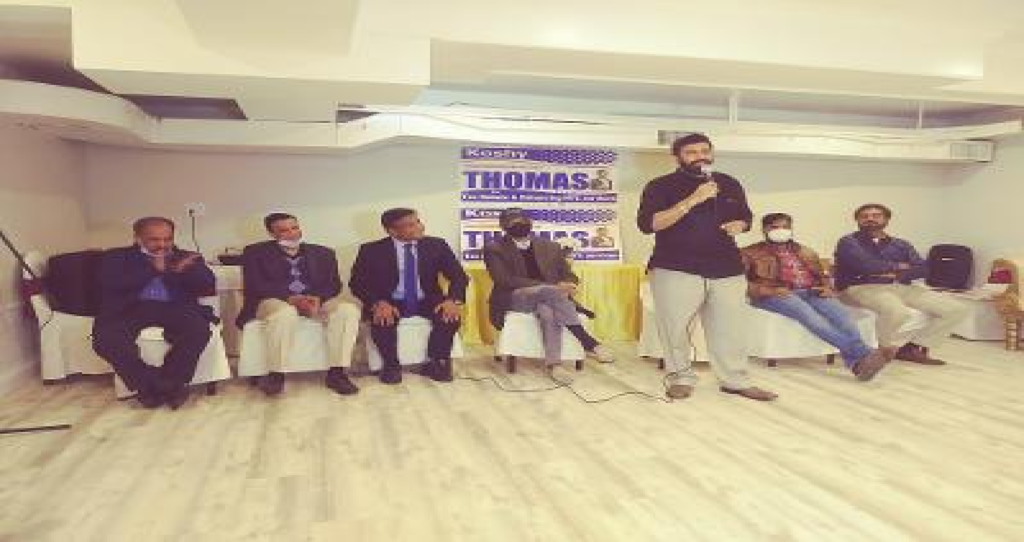 Aniayan George, President of FOMAA (Federation Of Malayalee Associations of Americas), characterized Koshy Thomas as someone who identifies with the community regardless of their background and someone who has the energy, willingness, and capacity to elevate his contributions further as an NYC Councilman. “ I believe Koshy Thomas can win this election, and he will be our first Asian Indian representation in the City Council,” he added.
Aniayan George, President of FOMAA (Federation Of Malayalee Associations of Americas), characterized Koshy Thomas as someone who identifies with the community regardless of their background and someone who has the energy, willingness, and capacity to elevate his contributions further as an NYC Councilman. “ I believe Koshy Thomas can win this election, and he will be our first Asian Indian representation in the City Council,” he added.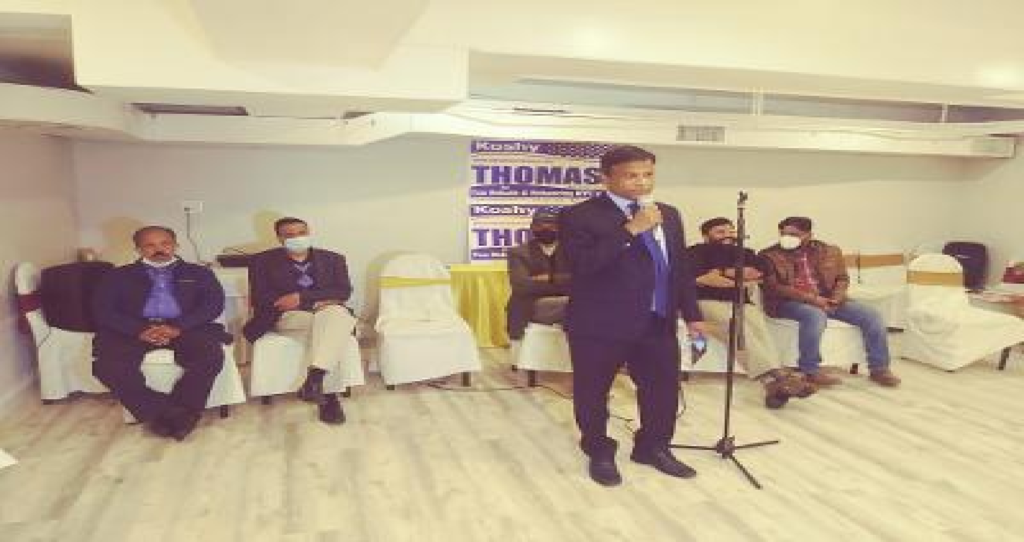 V.M. Chacko, a leading community activist in Queens over four decades, pointed out the potential the community has in this upcoming election and said, “this is not the time to be lackadaisical, and please get involved for the sake of the safety and wellbeing of our community.” Mr. V. Abraham (Raju) described the success the campaign has had in terms of timely submission of the nomination forms and increased awareness of Koshy’s candidacy across the District. Mr. George Parampil, who has been urging Koshy Thomas to run over the years, applauded his dedication to the community and threw his full support behind him.
V.M. Chacko, a leading community activist in Queens over four decades, pointed out the potential the community has in this upcoming election and said, “this is not the time to be lackadaisical, and please get involved for the sake of the safety and wellbeing of our community.” Mr. V. Abraham (Raju) described the success the campaign has had in terms of timely submission of the nomination forms and increased awareness of Koshy’s candidacy across the District. Mr. George Parampil, who has been urging Koshy Thomas to run over the years, applauded his dedication to the community and threw his full support behind him.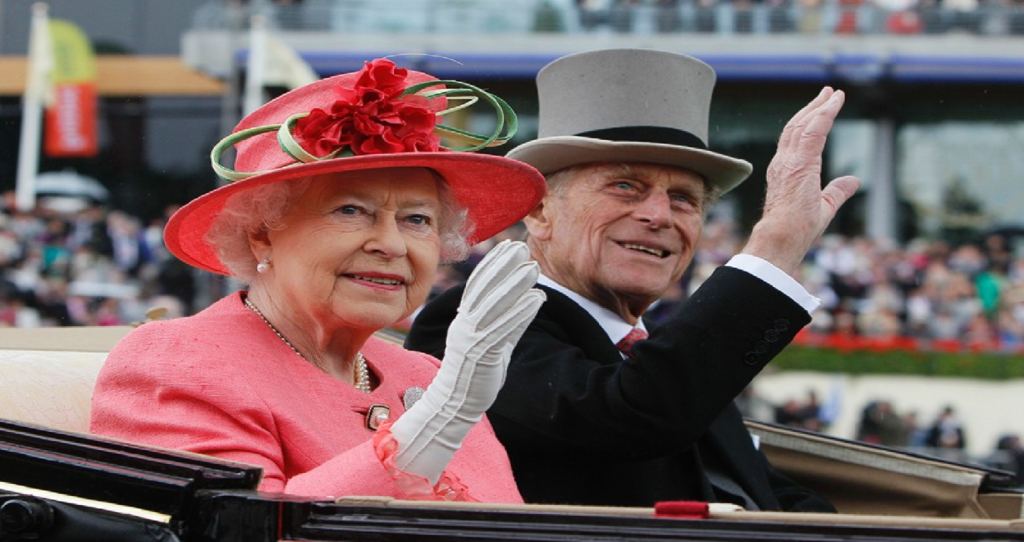 Prince Philip was the only son and the last child of Alice and Andrew. He was born in June 1921 at the Greek island of Corfu in a villa named Mon Repos which the couple had inherited from Andrew’s father, king George.
Prince Philip was the only son and the last child of Alice and Andrew. He was born in June 1921 at the Greek island of Corfu in a villa named Mon Repos which the couple had inherited from Andrew’s father, king George. Rajinikanth has extended ‘deepest gratitude’ for all the love, greetings, and wishes he received after the announcement. The award will be given to the star for his stupendous contribution to the world of Indian cinema. The ‘Robot’ actor took to Twitter and extended his deepest gratitude to all those who took out time to wish him. “For all the love, greetings & wishes I’ve received from eminent political leaders, my film fraternity friends & colleagues, well-wishers, media, every person who took the time to wish me & my beloved fans from across India & all over the world .. my deepest gratitude and thanks,” tweeted Rajinikanth.
Rajinikanth has extended ‘deepest gratitude’ for all the love, greetings, and wishes he received after the announcement. The award will be given to the star for his stupendous contribution to the world of Indian cinema. The ‘Robot’ actor took to Twitter and extended his deepest gratitude to all those who took out time to wish him. “For all the love, greetings & wishes I’ve received from eminent political leaders, my film fraternity friends & colleagues, well-wishers, media, every person who took the time to wish me & my beloved fans from across India & all over the world .. my deepest gratitude and thanks,” tweeted Rajinikanth. He has delivered hit films such as ‘Billu’, ‘Muthu’, ‘Baashha’, ‘Sivaji’, and ‘Enthiran’. Rajinikanth was last seen in AR Murugadoss’s ‘Darbar’. Currently, he is shooting for his upcoming film ‘Annaatthe.’ Among his numerous hits are films like “Baashha”, “Sivaji” and “Enthiran”. He is known as Thalaivar or leader by his fans.
He has delivered hit films such as ‘Billu’, ‘Muthu’, ‘Baashha’, ‘Sivaji’, and ‘Enthiran’. Rajinikanth was last seen in AR Murugadoss’s ‘Darbar’. Currently, he is shooting for his upcoming film ‘Annaatthe.’ Among his numerous hits are films like “Baashha”, “Sivaji” and “Enthiran”. He is known as Thalaivar or leader by his fans.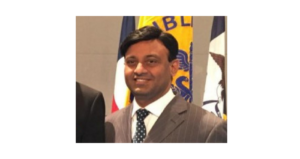 Dr. Reddy along with the other 2 winners, Laurence “Larry” Herman and James P. Nagle last night have accumulated “the three highest unofficial vote totals with 100% of precincts reporting in the election for three four-year terms on the Village Board,” Chicago Tribune reported today. Dr. Reddy said he decided to run with Herman and Nagle because he believes the three of them can address the most critical issues impacting the village better than anyone else, each with their own unique skills.
Dr. Reddy along with the other 2 winners, Laurence “Larry” Herman and James P. Nagle last night have accumulated “the three highest unofficial vote totals with 100% of precincts reporting in the election for three four-year terms on the Village Board,” Chicago Tribune reported today. Dr. Reddy said he decided to run with Herman and Nagle because he believes the three of them can address the most critical issues impacting the village better than anyone else, each with their own unique skills.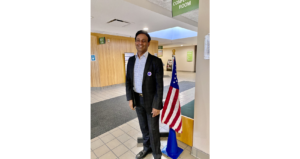 Dr. Reddy comes with immense experiences and proven leadership. He grew up in the suburbs of Hyderabad in Southern India. A financial conservator, Dr. Reddy always had a passion for “uniting and bringing people together.” Recalling his childhood, the dynamic leader says, “It all started during my childhood with bringing neighborhood kids together to play “gully cricket” and also bringing people together in college to organize events, demonstrations, and educational tours. Bringing opposing parties to the table for resolving issues has always been my strong strength since my schooling days.”
Dr. Reddy comes with immense experiences and proven leadership. He grew up in the suburbs of Hyderabad in Southern India. A financial conservator, Dr. Reddy always had a passion for “uniting and bringing people together.” Recalling his childhood, the dynamic leader says, “It all started during my childhood with bringing neighborhood kids together to play “gully cricket” and also bringing people together in college to organize events, demonstrations, and educational tours. Bringing opposing parties to the table for resolving issues has always been my strong strength since my schooling days.”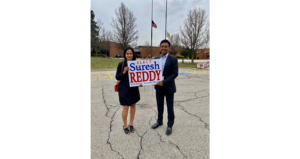 A dynamic leader, Dr. Reddy has devoted a greater part of his life to numerous initiates within the United States , in addition to serving his people back in India, As part of his community service, Dr. Reddy has facilitated and organized numerous health camps and workshops, with special emphasis on CPR training , obesity prevention in conjunction with Chicago Medical Society. During the Covid Pandemic, Dr. Reddy facilitated more than a hundred webinars and health awareness events. He facilitated honoring of more than 10,000 nurses who work selflessly in the line of duty against Covid in over 100 hospitals in over 40 states including Alaska. He led a campaign donating blankets to the needy during the last winter and would like to do the same this winter.
A dynamic leader, Dr. Reddy has devoted a greater part of his life to numerous initiates within the United States , in addition to serving his people back in India, As part of his community service, Dr. Reddy has facilitated and organized numerous health camps and workshops, with special emphasis on CPR training , obesity prevention in conjunction with Chicago Medical Society. During the Covid Pandemic, Dr. Reddy facilitated more than a hundred webinars and health awareness events. He facilitated honoring of more than 10,000 nurses who work selflessly in the line of duty against Covid in over 100 hospitals in over 40 states including Alaska. He led a campaign donating blankets to the needy during the last winter and would like to do the same this winter.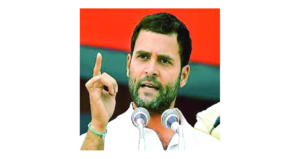 Rahul won his first election with an overwhelming margin of 2,90,853 votes — a testament to the faith placed by the people of his constituency in him. From the beginning, it was apparent that Rahul believed that our nation’s future lies with her people. Through the ebbs and flows of a decade-long political career, Rahul has held true to the very principles that won him the hearts of the people in his very first election.
Rahul won his first election with an overwhelming margin of 2,90,853 votes — a testament to the faith placed by the people of his constituency in him. From the beginning, it was apparent that Rahul believed that our nation’s future lies with her people. Through the ebbs and flows of a decade-long political career, Rahul has held true to the very principles that won him the hearts of the people in his very first election. Dr. Chakrabarty has been a dreamer and devoted his talents for charity and noble deeds from childhood onwards. “Since my childhood I have been motivated for philanthropic activities that includes several school fund raising activities, organizing inter college meets in college forming a musical group in India and here primarily for fund raising.” And, as an ardent and active member of AAPI, Dr. Chakrabarty has continued these noble deeds as an adult.
Dr. Chakrabarty has been a dreamer and devoted his talents for charity and noble deeds from childhood onwards. “Since my childhood I have been motivated for philanthropic activities that includes several school fund raising activities, organizing inter college meets in college forming a musical group in India and here primarily for fund raising.” And, as an ardent and active member of AAPI, Dr. Chakrabarty has continued these noble deeds as an adult. Dr. Chakrabarty says, he wants to have AAPI Charitable Foundation to be the main frame of AAPI make it more accountable. Making our noble efforts known to the society is important, he says, “We need to make their services more prominently advertised. Anytime we do press conference we use primarily them as example of what we are doing but we do not give them the support that they need.”
Dr. Chakrabarty says, he wants to have AAPI Charitable Foundation to be the main frame of AAPI make it more accountable. Making our noble efforts known to the society is important, he says, “We need to make their services more prominently advertised. Anytime we do press conference we use primarily them as example of what we are doing but we do not give them the support that they need.” Dr. Reddy comes with immense experiences and proven leadership. Dr. Reddy grew up in the suburbs of Hyderabad in Southern India. A financial conservator, Dr. Reddy always had a passion for “uniting and bringing people together.” Recalling his childhood, the dynamic leader says, “It all started during my childhood with bringing neighborhood kids together to play “gully cricket” and also bringing people together in college to organize events, demonstrations, and educational tours. Bringing opposing parties to the table for resolving issues has always been my strong strength since my schooling days.”
Dr. Reddy comes with immense experiences and proven leadership. Dr. Reddy grew up in the suburbs of Hyderabad in Southern India. A financial conservator, Dr. Reddy always had a passion for “uniting and bringing people together.” Recalling his childhood, the dynamic leader says, “It all started during my childhood with bringing neighborhood kids together to play “gully cricket” and also bringing people together in college to organize events, demonstrations, and educational tours. Bringing opposing parties to the table for resolving issues has always been my strong strength since my schooling days.”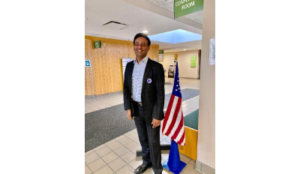 What motivates him to take on yet another challenging role for the betterment of the community? “My mantra is: If you don’t lead, someone else will lead you. If you don’t pick the right leader, the wrong leader will pick you, and as my good friend US Congressman Raja Says, and if you are not on the table, you will be on the menu
What motivates him to take on yet another challenging role for the betterment of the community? “My mantra is: If you don’t lead, someone else will lead you. If you don’t pick the right leader, the wrong leader will pick you, and as my good friend US Congressman Raja Says, and if you are not on the table, you will be on the menu
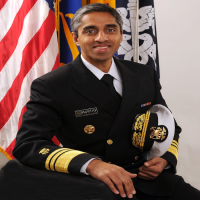 “Dr. Vivek Murthy represents the next generation of Indian American physicians,” Dr. Amit Chakrabarty, Secretary of AAPI said. “Dr. Murthy was America’s youngest-ever top doctor, and he was also the first surgeon general of Indian-American descent, when appointed by President Barack Obama in 2014. Now that he has been confirmed by the Senate, Dr. Murthy will play a key role in the administration’s response to many daunting healthcare issues, including the pandemic that has taken the lives of hundreds of thousands of Americans.”
“Dr. Vivek Murthy represents the next generation of Indian American physicians,” Dr. Amit Chakrabarty, Secretary of AAPI said. “Dr. Murthy was America’s youngest-ever top doctor, and he was also the first surgeon general of Indian-American descent, when appointed by President Barack Obama in 2014. Now that he has been confirmed by the Senate, Dr. Murthy will play a key role in the administration’s response to many daunting healthcare issues, including the pandemic that has taken the lives of hundreds of thousands of Americans.” Lincolnwood Alliance candidates in the current elections are Jesal Patel for Mayor, Beryl Herman for Clerk, and three candidates Jean Ikezoe-Halevi, Grace Diaz Herrera, Mohammed Saleem for Trustees.Jesal, for over 14 years, has proven his honesty and integrity through his work and community service. Being a finance graduate, he envisions a thriving Lincolnwood through smart planning by creating new business opportunities as well as employment opportunities. He has many years of experience as a small business owner behind him. His firsthand knowledge and experience as an entrepreneur help him understand how important it is to support small businesses so they can expand, create new jobs, and thrive in our community.
Lincolnwood Alliance candidates in the current elections are Jesal Patel for Mayor, Beryl Herman for Clerk, and three candidates Jean Ikezoe-Halevi, Grace Diaz Herrera, Mohammed Saleem for Trustees.Jesal, for over 14 years, has proven his honesty and integrity through his work and community service. Being a finance graduate, he envisions a thriving Lincolnwood through smart planning by creating new business opportunities as well as employment opportunities. He has many years of experience as a small business owner behind him. His firsthand knowledge and experience as an entrepreneur help him understand how important it is to support small businesses so they can expand, create new jobs, and thrive in our community.